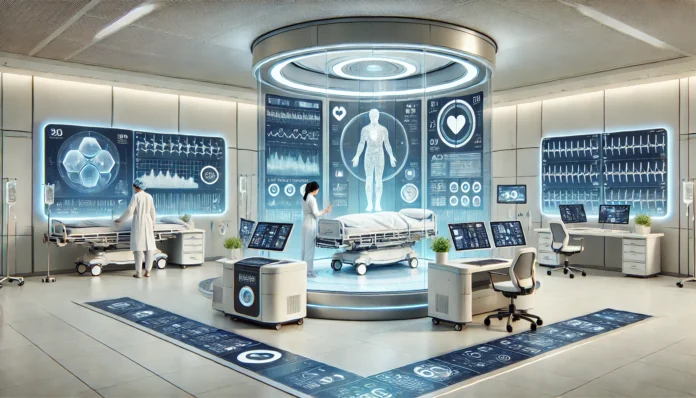Introduction
Artificial intelligence (AI) is revolutionizing many industries, and healthcare is at the forefront of this change. Machine learning (ML) is helping healthcare providers improve patient care, enabling faster diagnoses, personalized treatments, and more efficient healthcare operations. This article explores how AI and ML are transforming healthcare, offering better solutions to both patients and medical professionals.
10 AI Tools You Should Be Using in 2024
How AI and Machine Learning are Used in Healthcare
AI and machine learning models are now critical components in many healthcare settings. Their applications range from medical imaging to predictive analytics and drug discovery, creating a more efficient and accurate system.
- Efficiency: AI speeds up repetitive tasks, such as data analysis, making it easier for healthcare providers to process information.
- Accuracy: ML algorithms reduce human error by detecting patterns in data that may be missed by healthcare professionals.
- Cost-Effectiveness: By streamlining healthcare workflows, AI helps reduce operational costs.
AI Applications in Healthcare
1. Diagnostic Tools and Medical Imaging
AI-powered medical imaging systems, such as those developed by Google Health, are revolutionizing the way diseases like breast cancer are diagnosed. These models are trained on thousands of mammograms, allowing them to detect cancer earlier and more accurately than traditional methods(Health Imaging). AI’s ability to detect abnormalities quickly leads to early diagnoses, improving patient outcomes.
2. Personalized Medicine
Machine learning models help personalize treatments for patients by analyzing large datasets, including genetic information, to create customized care plans. AI tools like IBM Watson use patient data to recommend cancer treatment plans tailored to individual needs(Google AI). This ensures that treatments are more effective and reduce side effects.
3. Virtual Health Assistants
AI-driven virtual assistants are transforming telemedicine by helping patients manage their health remotely. These chatbots answer questions, remind patients to take medication, and even schedule appointments. By integrating natural language processing (NLP), these tools offer real-time assistance.
4. Predictive Analytics for Patient Care
AI models analyze historical data to predict which patients are at risk of developing complications or being readmitted to the hospital. This allows healthcare providers to take proactive steps, reducing hospital readmissions and improving overall patient care(What Is Google Health? – Google Health).
5. Drug Discovery and Development
AI accelerates the drug discovery process, allowing researchers to simulate how different compounds will interact with the human body. Machine learning algorithms help identify potential drug candidates much faster than traditional methods, saving both time and resources(Google AI).
Case Studies: AI in Action
Example 1: AI for Early Cancer Detection
Google’s AI system outperforms radiologists in detecting breast cancer from mammograms, reducing false positives and false negatives(Health Imaging). By catching cancer earlier, AI helps improve treatment success rates and reduces the strain on healthcare professionals.
Example 2: Chronic Disease Management with AI
AI-powered platforms are helping patients manage chronic diseases like diabetes and hypertension. These platforms monitor patients’ vitals in real-time, allowing healthcare providers to adjust treatments accordingly.
Example 3: Reducing Hospital Readmissions
By using predictive analytics, hospitals can identify high-risk patients and intervene early, reducing hospital readmissions and improving outcomes
(What Is Google Health? – Google Health).
Challenges and Ethical Considerations in AI Healthcare
While AI offers many benefits, it also presents challenges, such as:
- Data Privacy: As AI systems rely on vast amounts of patient data, ensuring data privacy and adhering to regulations like HIPAA is crucial.
- Ethical Concerns: Decisions driven by AI raise ethical questions. While AI can help diagnose patients, human oversight is needed to avoid errors or biases in the algorithms.
- Bias in Algorithms: AI systems must be trained on diverse datasets to avoid biased outcomes, ensuring equitable care for all patients(Google AI).
The Future of AI in Healthcare
Looking ahead, AI’s role in precision medicine, robotic surgery, and remote patient monitoring will continue to grow. With its ability to process large datasets, AI will become indispensable in personalizing treatments and improving patient care.
Conclusion
AI and machine learning are at the core of healthcare’s future. From improving diagnostics to personalizing treatment plans and enhancing patient care, the benefits of adopting AI in healthcare are undeniable. As these technologies evolve, healthcare providers must work toward integrating them ethically and responsibly to improve both patient outcomes and healthcare efficiency.



